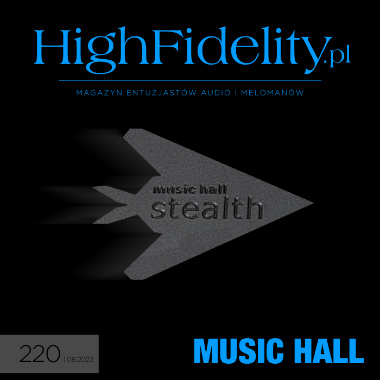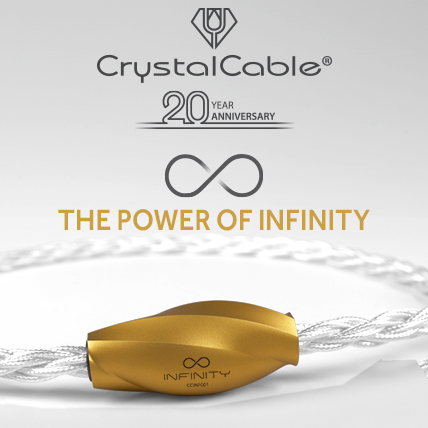No. 247 December 2024
- COVER REVIEW: Daniel Hertz MARIA 800 & CHIARA ⸜ integrated amplifier & loudspeakers » ITALY
- SHOW COVERAGE: There and back again, i.e., my AUDIO VIDEO SHOW 2024 » POLAND / Warsaw
- REVIEW: Accuphase E-700 ⸜ integrated amplifier » JAPAN
- REVIEW: Acoustic Revive USB-1.0PL TRIPLE-C & RUT-1K ⸜ USB cable & filter » JAPAN
- REVIEW: Espirit Cables ETERNA ⸜ RCA interconnects + speaker cables » FRANCE
- REVIEW: Miyajima Laboratory SHILABE (2024) ⸜ MC cartridge » POLAND
- REVIEW: XACT IMMOTUS CL & CRX ⸜ anti-vibration feet » POLAND
- MUSIC ⸜ Our Albums Series, review: ALISON MOYET, Key, Cooking Vinyl COOKCD921AM, Compact Disc ⸜ 2024 » UNITED KINGDOM

|
Editorial
text WOJCIECH PACUŁA |
 |
No 220 September 1, 2022 |
|
FUTURE NOSTALGIA, or about regression

⸜ HERBIE HANCOCK Future Shock on LP • photo Sony Music It's just that - apparently - a large part of the population is not interested in changes. In fact, they are hostile to them. Once known, loved and remembered, whatever it is, it becomes a model for a lifetime. Each deviation from it is perceived not as a transition to a new phase, but as a departure from the norm, deviation, often even - theft. After all, music and art belong not only to the creator. As its co-owners, we want to decide about its shape. And our decision is unequivocal: we don't want anything to change. Most of the material on Hancock's album was composed by avant-garde bassist and producer Bill Laswell and keyboardist and producer Michael Beinhorn. The inclusion of Davis's former collaborator in the compositional process pushed the material towards postmodernism. This electro-funk material turned out to be an early example of instrumental hip-hop, ahead of its time. The title of the album in question perfectly reflects how the material was received. "Shock" and "disbelief" - both terms describe its reception well. However, the shock in this context turns out to be something positive. It forces you to think, to not be numb and, at least for some of us, to reevaluate our habits. Shock allows us to change. It is a postcard sent to the future. At the other pole of this transition is the DUA LIPA's second album Future Nostalgia, released in March 2020. As in the case of Hancock's album, the title is also "significant" here. The artist, together with producers, Jeff Bhasker, Ian Kirkpatrick, Stuart Price, the Monsters & Strangerz team and Koz, created "nostalgic" pop and disco music referring to the 1970s. They created music that the singer liked as a child. Hancock's shock has been replaced with nostalgia. A postcard to the future has turned into a postcard from the past. The paradigm shift that I would like to highlight was sealed by the Warner Bros’ commercial decisions. In August of the same year when Lipa's album was released, its remixed version for dance clubs hit the market: Club Future Nostalgia, and in January of the following year it was "resumed" (after ten months ...) as the The Moonlight Edition special edition. This is a classic example of monetizing what we would say "content" and maximizing profits. Nostalgia is a lock-pick here that allows you to increase sales and it is no longer a shock. Interestingly, the material on Dua Lipa's album is really good, even very good. Experienced producers, an excellent singer and the publisher's good decisions resulted in nominations for the most important industry awards, Grammy, in the Best Pop Vocal Album category, and Brit Awards (British Album of the Year). According to the International Federation of the Phonographic Industry (IFPI), Future Nostalgia sold an incredible 3.3 million copies in 2020, including all forms of distribution. 
⸜ DUA LIPA Future Nostalgia LP version for the French market • photo Warner Music People loved this album because it brought them back to the past. The title "future" was not meant to change our views, or force us to rethink our choices, including aesthetic ones. Its real purpose was exactly the opposite of what the word "shock" meant. It was supposed to calm us down and release us from tension. It was supposed to allow us to forget about the shock of the future, which was a liberation for the artists older than Dua Lipa. Instead of freeing itself, it proposed to close oblivion in a "golden cage". This trend of rejection of change has been with us for years. As soon as the West picked up "acceleration". John Brunner, mentioned at the beginning, wrote his novel in reaction to too rapid changes. Changes forced on us by governments and corporations. This dystopian science fiction novel, published in 1975, predicted much of what was happening here and now. That is, the constant pressure on the individuals and the defense reactions the latter try to save themselves with. One such mechanism is to dive into the past. Don't we see it every day, also in audio? What else is the coexistence of tubes and transistors, vinyl records and audio files? I am not saying that one or the other is better/worse, but I am only pointing the direction. It is a direction towards the past, backwards. So: regressive. Mass culture multiplies it, making it a self-replicating, constantly amplified trend. As in positive feedback loop. Whether we like it or not, we live, as someone said, simultaneously in all times. Vinyl and file, tube and transistor - on one shelf, praised with equal commitment. The defense mechanism I was talking about was picked up by manufacturers, leading to the creation of devices such as the one proposed by the Yamaha company. Yamaha Design Lab has designed a range of smartphone compatible products for music playback. |
The most interesting thing seems to be a gadget for duplicating vinyl records straight from a mobile phone, called TurnT. How it's possible? As you can see in the video posted by VINYL FACTORY, the Yamaha device is a Bluetooth speaker. However, it also features something like a tonearm and a "cartridge" that "reads" the position on the screen. TurnT works with a smartphone in such a way that thanks to the application installed on it, it "knows" when we put the arm on it and then it starts playing a disc, which is actually spinning on the display. This one product captures everything we've talked about before: the shock of the future with cellphones and the nostalgia of the future with vinyl; nota bene - few SF writers have foreseen cellphones and none of them in the form as we know it. 
⸜ Yamaha Design Lab TurnT • photo Yamaha Design Lab In the macro space - audio is the nona world, at most - we are dealing with a similar cannibalism. What else are the sold-out ABBA concerts featuring their avatars? The music of the 1970s combined with modern technology gives exactly what Dua Lipa achieved with her album - the feeling that we touch the future, at the same time separating us from it. It is not an unknown future anymore, but a tamed, safe future. Except that - as MICHAŁ WIECZOREK, author of the article Nowe Przestrzenie says, it is nothing else than a "hybrid hoax" (Dwutygodnik No. 338, 07/2022, accessed on July 26th 2022). This combination of nostalgia and futurism is based in sociology and psychology on the one hand, but is driven by the economy on the other. Wieczorek cites the diagnosis of the American economist Alan B. Kruger, who died in 2019. In his latest book Rockonomics: What the Music Industry Can Teach Us about Economics (and Our Future), Kruger says that with the growing popularity of streaming, the ever stronger oligopoly on the concert organization market and the specificity of the industry, the middle class of music will disappear. The point is that with the current model of selling (renting) music files, only the biggest will earn good money, and the rest will survive at the lowest level and work in other sectors. In this way, nostalgia eats up the industry it feeds on. Cause it's plundering, sucking money out like a vampire. While Dylan, Davis or Hancock brought something new to the music through a change, created a new quality, Dua Lipa lost this novelty. The "new" is only the "old". All pop culture is currently geared towards this direction of exploration. And the fact that I really like the Future Nostalgia album is only a confirmation of this thesis. I am not alone in this. According to the Billboard magazine, the singer's album was one of the best albums of the 21st century - this is the status for 2022. There is something else to it. I do not know if you have noticed that both the emblem of "what-was", i.e. a vinyl record, and "what-will-be", which is an audio file, were developed long, long ago. From the point of view of a young man, both inventions are prehistoric. Although a gramophone record comes from the end of the 19th century, people already talked about playing music "from the computer" in the 1940s, and it was realized in the 1970s. Which means that an invention that is about fifty years old. The same applies to the tubes and the transistors and their "historical distance". Although the first tube was made in 1904, the transistor is not much younger. Walter Houser Brattain and John Bardeen invented it in 1947. The timeline distance between these inventions is smaller than from the invention of the transistor to the present day. 
⸜ Cover of the book Future Shock by ALVIN GARDENS • photo Gardners The thing is that all the "news" we talk about in audio are actually "antiques". With no exception. Nothing really innovative has been invented for many, many years. For decades we have been honing what we inherited after a time when large public money was spent on basic research and when it was the state, not the "market", that set the directions for development. Maybe Artificial Intelligence (AI) will change it. Perhaps it will. For now, however, it has been employed to comparing the contents of the songs. Business Insider has published an interesting article entitled A Harvard statistician has developed an algorithm that finally settles whether Lennon or McCartney wrote The Beatles' biggest hits, and "The Rolling Stones" Hear How AI Software Wrote a 'New' Nirvana Song; more HERE and HERE). Artificial intelligence has been harnessed in the service of music. But it's like hammering nails with a smartphone. You can do it, but it doesn't make sense. Having said that, I would like to share with you a deeper reflection that I have been carrying around for a long time. It seems that we live in a time of cultural and technological breakthrough. Once Rococo and currently postmodernism are clear signs of the exhaustion of the existing paradigms and patterns of behavior. Also what I'm talking about, which is reaching back into the past and calling it "the future", is about change. What change will it be, what new will we get? - It’s hard to say. However, if we want to break out of the trap of a futuristic-nostalgic shock, we have no other choice. Otherwise, we will sink into regression and never get out of it. ■ WOJCIECH PACUŁA |
About Us |
We cooperate |
Patrons |
|
Our reviewers regularly contribute to “Enjoy the Music.com”, “Positive-Feedback.com”, “HiFiStatement.net” and “Hi-Fi Choice & Home Cinema. Edycja Polska” . "High Fidelity" is a monthly magazine dedicated to high quality sound. It has been published since May 1st, 2004. Up until October 2008, the magazine was called "High Fidelity OnLine", but since November 2008 it has been registered under the new title. "High Fidelity" is an online magazine, i.e. it is only published on the web. For the last few years it has been published both in Polish and in English. Thanks to our English section, the magazine has now a worldwide reach - statistics show that we have readers from almost every country in the world. Once a year, we prepare a printed edition of one of reviews published online. This unique, limited collector's edition is given to the visitors of the Audio Show in Warsaw, Poland, held in November of each year. For years, "High Fidelity" has been cooperating with other audio magazines, including “Enjoy the Music.com” and “Positive-Feedback.com” in the U.S. and “HiFiStatement.net” in Germany. Our reviews have also been published by “6moons.com”. You can contact any of our contributors by clicking his email address on our CONTACT page. |
 



|
   |
main page | archive | contact | kts
© 2009 HighFidelity, design by PikselStudio,
projektowanie stron www: Indecity







 ELEASED EXACTLY THIRTY NINE YEARS AGO, in August 1983, HERBIE HANCOCK's album Future Shock divided jazz fans. It was not the first and not the last time that the performer, by changing the aesthetics, looking for a new direction for his work, "betrayed" the values that he had previously "professed". There are other examples, such as MILES DAVIS’s Bitches Brew (1970) or BOB DYLAN’s Bringing It All Back Home (1963). In each of these cases, the musicians went beyond the structures known to their fans in the past. They changed their music and themselves in such a way as to better describe the times they lived in.
ELEASED EXACTLY THIRTY NINE YEARS AGO, in August 1983, HERBIE HANCOCK's album Future Shock divided jazz fans. It was not the first and not the last time that the performer, by changing the aesthetics, looking for a new direction for his work, "betrayed" the values that he had previously "professed". There are other examples, such as MILES DAVIS’s Bitches Brew (1970) or BOB DYLAN’s Bringing It All Back Home (1963). In each of these cases, the musicians went beyond the structures known to their fans in the past. They changed their music and themselves in such a way as to better describe the times they lived in.


